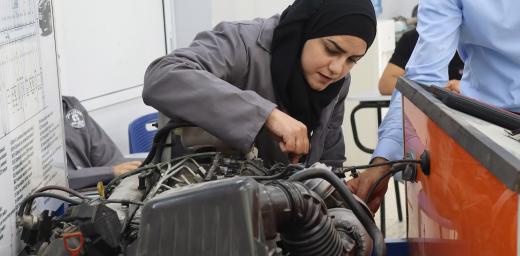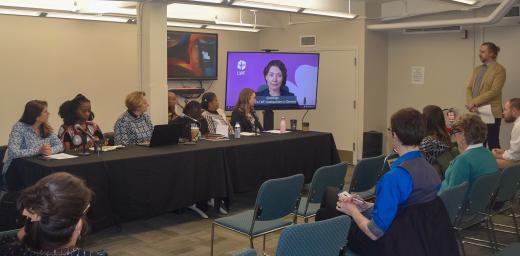LWF joins with partners to call for action on legally binding United Nations tax convention
(LWI) - An economy that works for women is an economy that works for everyone. That is why a legally binding United Nations tax convention to address the problem of illegal financial flows is a vital step towards achieving a more just and equitable world. The Lutheran World Federation (LWF), in partnership with ACT Alliance, Norwegian Church Aid (NCA) and the Finnish Evangelical Lutheran Mission (FELM), hosted an event on 12 March to highlight the need for such a convention in the work for gender justice.
The event entitled ‘Stealing our future’ focused on the ways that international tax abuse disproportionately impacts the lives of women and girls, especially in poorer parts of the world. NCA General Secretary and former vice president of the Norwegian parliament, Dagfinn Høybråten stressed that achieving greater tax justice is not simply a financial issue, but rather “it is a matter of life and death, a core question of justice and human dignity.” “Much of the efforts to achieve the Sustainable Development Goals will be in vain if the brokenness of the global tax system is not fixed,” he said.
Over the past couple of years, Høybråten noted, there has been a growing understanding of the importance of tax justice. He paid tribute to African states that have been leading efforts for a UN convention “in which all countries can participate on an equal footing.” He said he is optimistic that “the world has the resources to resolve this crisis and we will continue to challenge governments and other organizations to keep this high on the agenda.
Money lost to illicit financial flows “could address the shameful levels of homelessness and mend our healthcare system.”
Uhuru Dempers, director of social development for the Evangelical Lutheran Church in the Republic of Namibia
Namibia’s deputy minister of Finance and Public Enterprise, Maureen Hinda-Mbuende also endorsed the efforts of civil society to support the work for a legally binding UN convention. Noting that Namibia took part in the African Union’s pilot program for tackling illicit financial flows, she said that economic imbalances between rich and poor countries “are not inevitable if there can be a level playing field for all countries to compete.”
Economic Alex Cobham, head of the Tax Justice Network, spoke of the different faces of illicit financial flows, including tax abuse, but also abuse of power by politicians to assign contracts and the laundering of criminal proceeds. High income countries also incur significant losses because of this abuse, he said, but lower income countries lose the greatest share of public spending. For example, he said “9 percent of public health budgets are lost to tax abuse in higher income countries, but lower income nations lose 49 percent of their health budgets, leading to excess child mortality.”
Uhuru Dempers, director of social development at the Evangelical Lutheran Church in the Republic of Namibia, noted that many governments offer large tax incentives to big corporations, while at the same time introducing regressive taxation that puts the greatest pressure on women. With the billions of dollars lost to illicit financial flows, he said, Namibia could “address the shameful levels of homelessness and mend our healthcare system, as well as work towards other SDGs we are struggling to achieve.”
New International Financial and Economic Architecture
Dempers spoke of the work of the New International Financial and Economic Architecture program (NIFEA), promoted by LWF and other ecumenical partners. He noted that a global wealth tax could raise an estimated 4.4 trillion dollars a year, which would enable governments to "invest and fund our own development, instead of borrowing from the World Bank or International Monetary Fund under very harsh conditions.” Similarly, a suggested carbon tax on the world’s worst polluters “could help address the urgent environmental challenges we are facing,” he added.
Dr Ortrun Merkle, a researcher from the UN University who focuses on corruption, gender and migration, underlined the need for more data to understand “how best to mainstream gender while dealing with illicit financial flows.” Loss of resources for development and domestic investment “means less money for government commitments to gender equality,” while regressive tax reforms have “the harshest impact on women-headed households.” Illicit financial flows also significantly increase the risk of human trafficking, “one of the most lucrative businesses worldwide, with women and girls disproportionately affected,” she said.
Dr Nicole Maloba, a law and policy researcher with FEMNET, the African Women’s Development and Communications Network, agreed that more work needs to be done to understand how to develop “a gender-sensitive lens” in dealing with tax evasion and other illicit financial flows. Many organizations, she said, fail to provide gender segregated data, making it harder to provide evidence for the many ways in which women are the worst affected. “We must look again at our tax system and make sure that our policies are having a positive impact on women at the grassroots,” she said.






